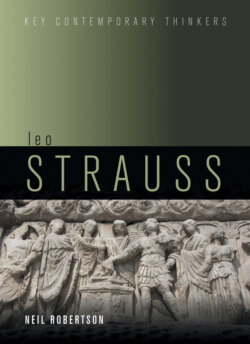Читать книгу Leo Strauss - Neil G. Robertson - Страница 11
The Theological-Political Problem
ОглавлениеTo understand the significance and source of Strauss’s change of orientation and recovery of natural right, we must place it in the larger context of Strauss’s intellectual concerns. Strauss’s own description of this larger context is the “theological-political problem.” One way to view this problem is to see it in personal terms reflecting the predicament Strauss found himself in as a Jew who could no longer adhere to the orthodox faith in which he had been raised, but who equally could not identify himself with the larger German culture in which he found himself. Strauss experienced this as an antinomy between modern thought – ultimately Nietzschean atheism – and orthodoxy. The way out of this predicament was, for Strauss, in the return to pre-modern rationalism. Strauss first came to this discovery not in Plato or Socrates, but in medieval Jewish and Islamic thought, above all in the figure of Moses Maimonides (1138–1204).
In Maimonides, Strauss found a particular way of framing and understanding the theological-political problem. The term “theological-political” Strauss borrowed from the title of a book by the seventeenth-century Jewish philosopher Spinoza. Strauss understood the phrase to refer to the need of philosophy to establish itself and to defend its freedom from the forms of authority that belong to religion as well as to political power. In this book, we will look at these two tensions in turn. In chapter 2, we will focus on the tension between philosophy and religion, the tension between “Athens” and “Jerusalem.” Strauss argues that the biblical revelation, specifically Judaism, presents the most radical challenge to philosophy and its claims to determine the question of the best way to live on the basis of natural reason alone. For Strauss, the question of “the best life” is the orienting question of human life, and so the contest between reason and revelation is the most basic human question. Strauss’s interest in this debate is not simply to secure the claims of reason against any competitor, but more fundamentally to see in the debate itself a shift in the meaning of philosophy. For Strauss, the standpoints of reason and revelation are mutually irrefutable. But recognizing and engaging this “problem” for Strauss gives birth to a deepening understanding of what philosophy is and demonstrates its inherent limits, showing that its very context is constructed of fundamental and permanent problems.
